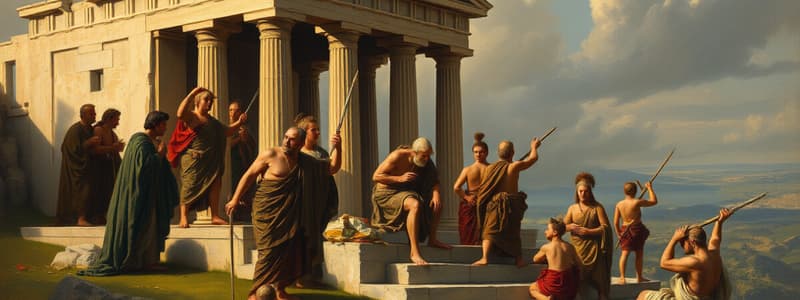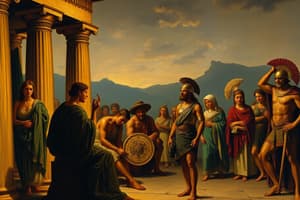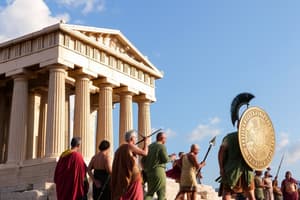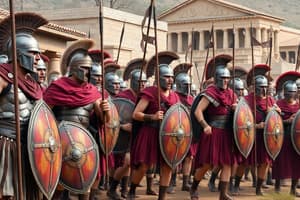Podcast
Questions and Answers
What is the basic unit of ancient Greek government?
What is the basic unit of ancient Greek government?
polis
What was notable about the roles and lives of women in Sparta?
What was notable about the roles and lives of women in Sparta?
They shocked most ancient Greeks.
Where did democracy first arise?
Where did democracy first arise?
Athens
What was the role of the Spartan Assembly?
What was the role of the Spartan Assembly?
What caused frequent wars between city-states in ancient Greece?
What caused frequent wars between city-states in ancient Greece?
How did the status of Spartan women compare to Athenian women?
How did the status of Spartan women compare to Athenian women?
Who benefited most from the oligarchies in ancient Greece?
Who benefited most from the oligarchies in ancient Greece?
What was the voice of Sparta's citizens in their government compared to Athenian citizens?
What was the voice of Sparta's citizens in their government compared to Athenian citizens?
Geography encouraged the development of independent governments because settlements were __________.
Geography encouraged the development of independent governments because settlements were __________.
Rank and describe the social classes of Ancient Greece.
Rank and describe the social classes of Ancient Greece.
Why was education important for the growth of democracy in Athens?
Why was education important for the growth of democracy in Athens?
Why were most educational opportunities in Athens available only to boys?
Why were most educational opportunities in Athens available only to boys?
Athens was concerned with __________, while Sparta valued discipline and military power.
Athens was concerned with __________, while Sparta valued discipline and military power.
What were some characteristics of Spartan society?
What were some characteristics of Spartan society?
Flashcards are hidden until you start studying
Study Notes
Key Concepts of Ancient Greek Governance
- Polis: The fundamental political unit in ancient Greece, serving as the city-state's governing body.
- Democracy: Originated in Athens, marking a significant development in governance, where citizens participated directly in political decisions.
- Oligarchy: Many Greek city-states were governed by a small group of wealthy individuals who primarily benefited from this system.
Spartan Society
- Role of Women: Spartan women enjoyed more freedom and authority compared to their Athenian counterparts, challenging societal norms of the time.
- Daily Governance: The Spartan Assembly elected five ephors responsible for managing the day-to-day functions of government.
- Military Focus: Spartan society emphasized discipline and military prowess with a culture that prioritized obedience and conformity over individual expression.
- Citizenship Voice: Spartan citizens had less influence in their government compared to Athenian citizens, reflecting a more rigid social structure.
Athenian Society
- Education: Athenian education aimed to cultivate active citizens for public life, primarily accessible to boys, as girls were not considered citizens and had no voting rights.
- Cultural Values: Athens celebrated beauty, luxury, and individuality, fostering an environment conducive to innovation and democratic development.
Social Classes in Ancient Greece
- Aristocrats: Wealthy landowners at the top tier, dominating both economic and political realms.
- Small Landowners and Artisans: A middle class composed of merchants and craftsmen, contributing to the economy but with limited power.
- Tenant Farmers and Landless Poor: Individuals without land, often dependent on wealthier classes for employment and subsistence.
- Slaves: The lowest social class, lacking rights and living under the control of their masters.
Geographic Influence on Governance
- Isolation by Geography: Mountainous terrain led to isolated settlements, each developing its own independent governance structure, resulting in numerous city-states.
- Local Governance: The primary settlement governed smaller regions around it, fostering a variety of political systems and cultures across ancient Greece.
Conflict Among City-States
- Frequent Wars: The independent and competitive spirit of the city-states often led to conflicts, impacting alliances and political dynamics within the region.
Comparison of Sparta and Athens
- Sparta vs. Athens:
- Sparta: Emphasized military strength and discipline; valued conformity over change; oligarchic rule.
- Athens: Focused on culture and individual excellence; more progressive, embracing democratic processes and civic participation.
Studying That Suits You
Use AI to generate personalized quizzes and flashcards to suit your learning preferences.





